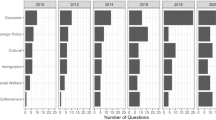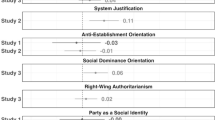Abstract
Intuitively, we associate different political parties with different types of policy. In contrast, this paper shows that in the absence of differential costs of membership among parties (that is, if party membership ischeap talk), party labels cannot perfectly signal the ideologies of candidates. However, under certain conditions parties can signal candidate types imperfectly. The paper therefore also provides an example of how costless communication can be effective in games of partial conflict.
Similar content being viewed by others
References
Banks, J.S. (1990). A model of electoral competition with incomplete information.Journal of Economic Theory 50: 309–325.
Crawford, V.P. and Sobel, J. (1982). Strategic information transmission.Econometrica 50(6): 1431–1451.
Downs, A. (1957).An economic theory of democracy. New York: Harper and Row.
Farrell, J. (1987). Cheap talk, coordination, and entry.Rand Journal of Economics 18(1): 34–39.
Harrington, J.E. Jr. (1992). The revelation of information through the electoral process: An exploratory analysis.Economics and Politics 4: 255–275.
Hotelling, H. (1929). Stability in competition.Economic Journal 39: 41–57.
Kreps, D. and Wilson, R. (1982). Sequential equilibria.Econometrica 50: 863–894.
Mueller, D.C. (1989).Public Choice II. Cambridge: Cambridge University Press.
Ordeshook, P.C. (1986).Game theory and political theory: An introduction. Cambridge: Cambridge University Press.
Author information
Authors and Affiliations
Additional information
I presented earlier versions of this paper at the 1992 meeting of the Public Choice Society in New Orleans, the 1992 meeting of the European Public Choice Society in Turin, and the 1992 European meeting of the Econometric Society in Brussels. I thank Jeff Banks, Dennis Coates, Roger Congleton, Roger Myerson, Bernard Steunenberg, and Akira Yokoyama for helpful comments, Joe Harrington for bringing his own related work to my attention, and the Sweden-America Foundation and the Swedish Council for Research in the Humanities and Social Sciences for financial support.
Rights and permissions
About this article
Cite this article
Wärneryd, K. Partisanship as information. Public Choice 80, 371–380 (1994). https://doi.org/10.1007/BF01053227
Accepted:
Issue Date:
DOI: https://doi.org/10.1007/BF01053227




